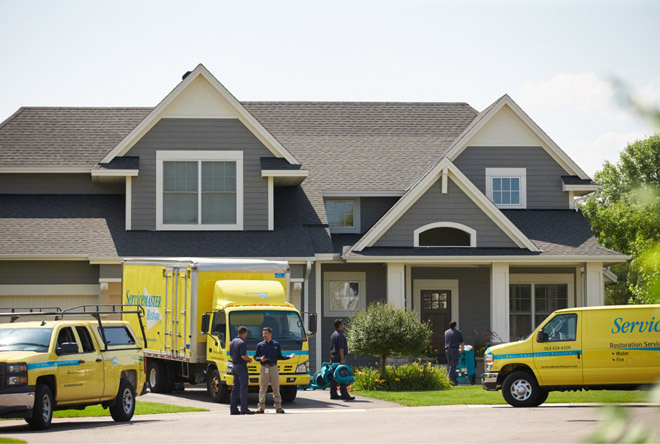Hoarding Removal Services
Hoarding is a complex mental health disorder characterized by the excessive accumulation of possessions, often to the point where living spaces become cluttered and unusable.
ServiceMaster of South-Central Omaha understands that hoarding can present complex challenges, and we offer professional hoarding cleaning services in the South-Central Omaha area. Our experienced team is trained to provide compassionate and effective solutions for hoarding situations. Here's an overview of our hoarding cleaning services:
Assessment and Planning: We begin with a thorough assessment of the hoarding situation. Our team works closely with the individual or family to understand their specific needs and concerns.
Customized Cleaning Plan: We create a customized cleaning plan based on the assessment. This plan outlines the steps, timeline, and resources required for cleaning.
Decluttering and Organizing: Our trained professionals assist in decluttering and organizing the affected areas. We prioritize safety and sensitivity throughout this process.
Cleaning and Sanitizing: We clean and sanitize the space, addressing health and safety hazards. Our team is equipped to handle extensive cleaning, including removing debris, odors, and biohazardous materials.
Content Cleaning: If personal belongings require cleaning and restoration, we offer content cleaning services to salvage items of value.
Disposal: Items that cannot be salvaged or pose a health risk are safely disposed of by local regulations.
Follow-Up Support: We provide ongoing support and resources to help individuals or families maintain a clutter-free and safe living environment.
ServiceMaster of South-Central Omaha is committed to helping individuals and families regain control of their living spaces and improve their overall quality of life. Our hoarding cleaning services are done with empathy, respect, and professionalism. We prioritize the well-being of our clients and ensure a safe and thorough cleaning process.
PREPARING A HOARDER FOR THE REMOVAL OF ITEMS
Preparing a hoarder to remove items is a delicate and challenging process. Here are some steps to consider:
Build Trust: Establish trust and rapport with the hoarder. Understand that they may have strong emotional attachments to their belongings.
Professional Help: Enlist the support of mental health professionals, such as therapists or counselors, who specialize in hoarding disorders. They can assess the hoarder's mental health and provide guidance.
Create a Plan: Work with the mental health professionals to create a plan for the removal process. This plan should be gradual and tailored to the individual's needs and progress.
Set Realistic Goals: Set achievable goals for decluttering. Start with small, manageable tasks and gradually work toward larger ones.
Prioritize Safety: Emphasize safety concerns, such as fire hazards or health risks, associated with the hoarded items. Highlight the importance of a safe living environment.
Respect Autonomy: While encouraging decluttering is important, respect the hoarder's autonomy and decision-making process. Avoid forcing them to part with items.
Support System: Encourage the hoarder to build a support system of friends and family members who can provide emotional support.
Professional Cleanup: Hire professional hoarding cleanup services. These experts are trained to handle the removal of items respectfully and organized.
Documentation: Consider documenting the process through photographs or videos. This can help the hoarder track progress and provide a sense of accomplishment.
Aftercare: Set up an aftercare plan, including ongoing therapy and support groups, to address the underlying causes of hoarding and prevent relapse.
Maintain Compassion: Throughout the process, maintain compassion and patience. Hoarding is a complex issue, and progress may need to be faster.
Remember that every hoarding situation is unique, and the approach should be tailored to the individual's specific needs and circumstances. Professional guidance and support are essential for a successful outcome.


